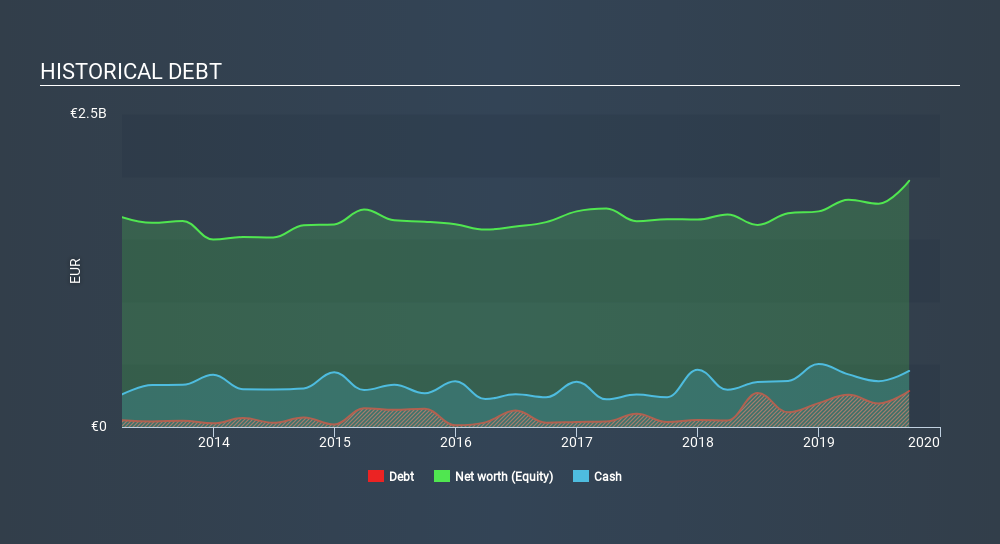
Howard Marks put it nicely when he said that, rather than worrying about share price volatility, 'The possibility of permanent loss is the risk I worry about... and every practical investor I know worries about. It's only natural to consider a company's balance sheet when you examine how risky it is, since debt is often involved when a business collapses. As with many other companies PUMA SE (ETR:PUM) makes use of debt. But the more important question is: how much risk is that debt creating?
When Is Debt A Problem?
Debt is a tool to help businesses grow, but if a business is incapable of paying off its lenders, then it exists at their mercy. Ultimately, if the company can't fulfill its legal obligations to repay debt, shareholders could walk away with nothing. However, a more frequent (but still costly) occurrence is where a company must issue shares at bargain-basement prices, permanently diluting shareholders, just to shore up its balance sheet. Of course, debt can be an important tool in businesses, particularly capital heavy businesses. When we examine debt levels, we first consider both cash and debt levels, together.
See our latest analysis for PUMA
How Much Debt Does PUMA Carry?
As you can see below, at the end of September 2019, PUMA had €287.9m of debt, up from €117 a year ago. Click the image for more detail. But it also has €447.4m in cash to offset that, meaning it has €159.5m net cash.

How Healthy Is PUMA's Balance Sheet?
Zooming in on the latest balance sheet data, we can see that PUMA had liabilities of €1.69b due within 12 months and liabilities of €893.9m due beyond that. Offsetting these obligations, it had cash of €447.4m as well as receivables valued at €794.8m due within 12 months. So it has liabilities totalling €1.35b more than its cash and near-term receivables, combined.
Given PUMA has a humongous market capitalization of €11.3b, it's hard to believe these liabilities pose much threat. However, we do think it is worth keeping an eye on its balance sheet strength, as it may change over time. While it does have liabilities worth noting, PUMA also has more cash than debt, so we're pretty confident it can manage its debt safely.
Also positive, PUMA grew its EBIT by 28% in the last year, and that should make it easier to pay down debt, going forward. The balance sheet is clearly the area to focus on when you are analysing debt. But it is future earnings, more than anything, that will determine PUMA's ability to maintain a healthy balance sheet going forward. So if you want to see what the professionals think, you might find this free report on analyst profit forecasts to be interesting.
Finally, a business needs free cash flow to pay off debt; accounting profits just don't cut it. PUMA may have net cash on the balance sheet, but it is still interesting to look at how well the business converts its earnings before interest and tax (EBIT) to free cash flow, because that will influence both its need for, and its capacity to manage debt. Looking at the most recent three years, PUMA recorded free cash flow of 36% of its EBIT, which is weaker than we'd expect. That weak cash conversion makes it more difficult to handle indebtedness.
Summing up
Although PUMA's balance sheet isn't particularly strong, due to the total liabilities, it is clearly positive to see that it has net cash of €159.5m. And it impressed us with its EBIT growth of 28% over the last year. So we don't think PUMA's use of debt is risky. Over time, share prices tend to follow earnings per share, so if you're interested in PUMA, you may well want to click here to check an interactive graph of its earnings per share history.
Of course, if you're the type of investor who prefers buying stocks without the burden of debt, then don't hesitate to discover our exclusive list of net cash growth stocks, today.
If you spot an error that warrants correction, please contact the editor at editorial-team@simplywallst.com. This article by Simply Wall St is general in nature. It does not constitute a recommendation to buy or sell any stock, and does not take account of your objectives, or your financial situation. Simply Wall St has no position in the stocks mentioned.
We aim to bring you long-term focused research analysis driven by fundamental data. Note that our analysis may not factor in the latest price-sensitive company announcements or qualitative material. Thank you for reading.
About XTRA:PUM
PUMA
Engages in the development and sale of sports and sports lifestyle products in Germany, rest of Europe, the United States, North America, and internationally.
Undervalued with excellent balance sheet and pays a dividend.
Similar Companies
Market Insights
Community Narratives



